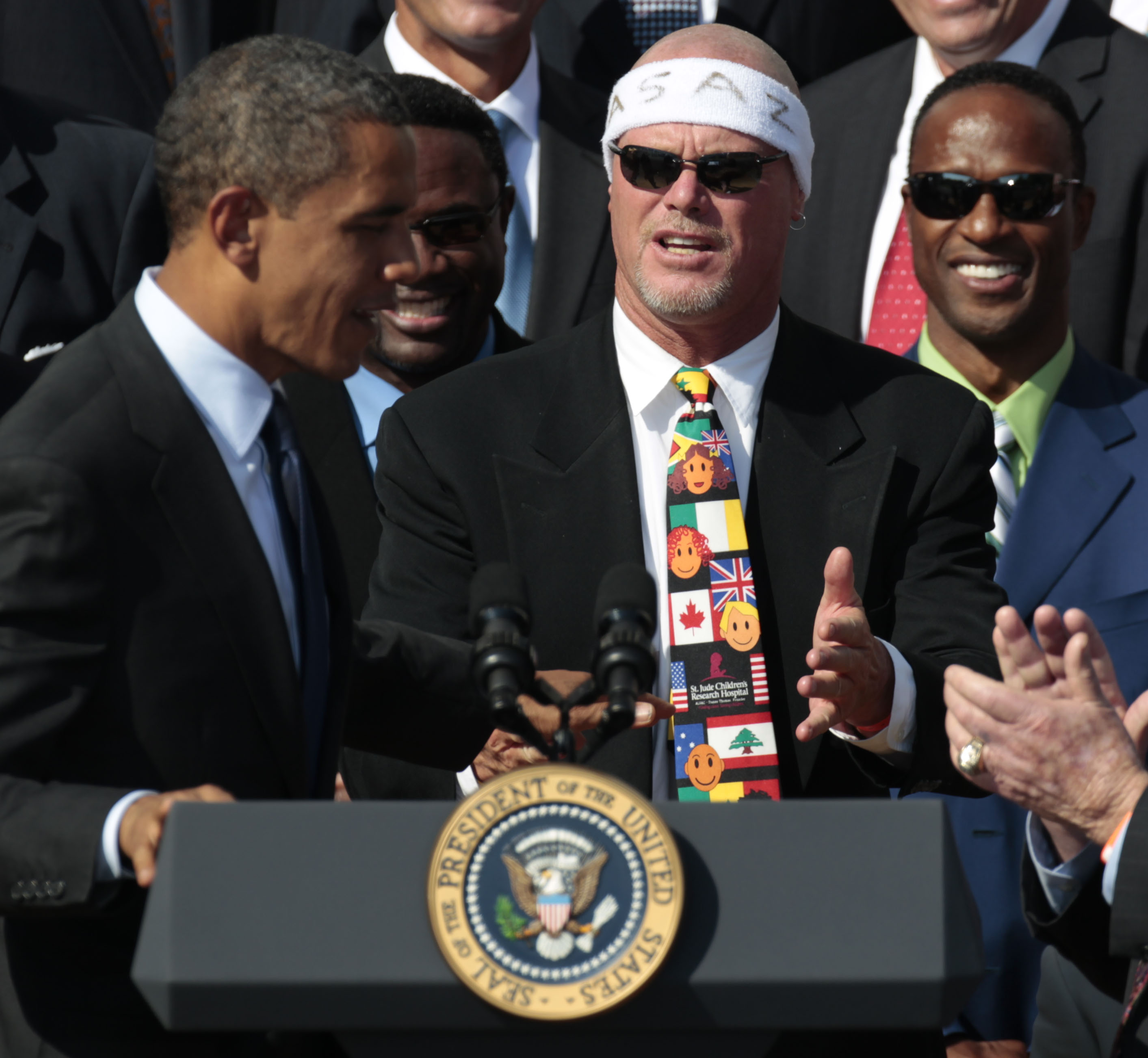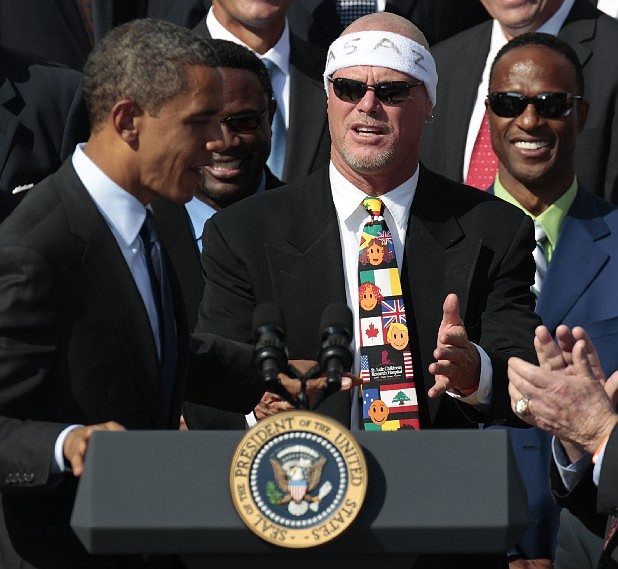 In this Oct. 7, 2011 file photo, President Barack Obama, left, looks towards quarterback Jim McMahon, wearing headband, as he honors the 1985 Super Bowl XX Champion Chicago Bears football team during a ceremony on the South Lawn of the White House in Washington. A group of retired NFL players, including McMahon, says in a lawsuit filed Tuesday, May 20, 2014, that the league illegally supplied them with risky painkillers that numbed their injuries and led to medical complications.
In this Oct. 7, 2011 file photo, President Barack Obama, left, looks towards quarterback Jim McMahon, wearing headband, as he honors the 1985 Super Bowl XX Champion Chicago Bears football team during a ceremony on the South Lawn of the White House in Washington. A group of retired NFL players, including McMahon, says in a lawsuit filed Tuesday, May 20, 2014, that the league illegally supplied them with risky painkillers that numbed their injuries and led to medical complications.WASHINGTON - Opening another legal attack on the NFL over the long-term health of its athletes, a group of retired players accused the league in a lawsuit Tuesday of cynically supplying them with powerful painkillers that kept them in the game but led to serious complications down the road.
The lawsuit, which seeks unspecified damages, charges the NFL with chasing profits over protecting its players' health. To speed injured athletes' return to the field, the league administered drugs illegally, without obtaining prescriptions or warning of the possible side effects, the plaintiffs contend.
Some football players say they were never told they had broken legs or ankles and were instead fed pills to mask the pain. One says that instead of surgery, he was given anti-inflammatory drugs and excused from practices so he could play in games. Others say that after years of free pills from the NFL, they retired addicted to the painkillers.
NFL spokesman Brian McCarthy, in Atlanta for the league's spring meetings, said: "We have not seen the lawsuit, and our attorneys have not had an opportunity to review it."
The case comes less than a year after the NFL agreed to pay $765 million to settle lawsuits from thousands of retired players who accused it of concealing the risks of concussions. The athletes blamed dementia and other health problems on the bone-crushing hits that helped lift pro football to new heights of popularity.
The new lawsuit was filed in federal court in San Francisco and names eight players as plaintiffs, including three members of the NFL champion 1985 Chicago Bears: quarterback Jim McMahon, Hall of Fame defensive end Richard Dent and offensive lineman Keith Van Horne.
More than 500 other former players have signed on to the lawsuit, according to lawyers, who are seeking class-action status for the case. Six of the plaintiffs also took part in the concussion-related litigation, including McMahon and Van Horne.
McMahon says he suffered a broken neck and ankle during his career, but instead of sitting out, he received medication and was pushed back onto the field. Team doctors and trainers never told him about the injuries, according to the lawsuit.
McMahon also became addicted to painkillers, at one point taking more than 100 Percocet pills per month, even in the offseason, the lawsuit says. Team doctors and trainers illegally administered the drugs, the lawsuit alleges, because they didn't get prescriptions, keep records or explain side effects.
Van Horne played an entire season on a broken leg and wasn't told about the injury for five years, "during which time he was fed a constant diet of pills to deal with the pain," the lawsuit says.
"The NFL knew of the debilitating effects of these drugs on all of its players and callously ignored the players' long-term health in its obsession to return them to play," said Steven Silverman, an attorney for the players. His Baltimore firm also represents former National Hockey League players in a concussion-related lawsuit.
Former offensive lineman Jeremy Newberry retired in 2009 and says that because of the drugs he took while playing, he suffers from kidney failure, high blood pressure and violent headaches.
In the lawsuit, he describes lining up in the San Francisco 49ers' locker room with other players to receive powerful anti-inflammatory injections in their buttocks shortly before kickoff. Newberry played for San Francisco from 1998 to 2006, including one season in which he played in every game but never practiced because of pain from his injuries, according to the lawsuit.
The lawsuit says other plaintiffs experienced a similar postgame ritual, with trainers handing out painkillers and sleeping aids "to be washed down by beer."
A look at ex-players' allegations in NFL lawsuit
WASHINGTON - In a lawsuit filed Tuesday, a group of retired NFL players says the league illegally supplied them with painkillers that numbed injuries and led to medical complications. Eight players are named. A look at some of what each alleges:
JIM MCMAHON: He says he discovered in 2011 or 2012 that he had suffered a broken neck. He believes it happened in 1993 when his legs went numb after a hit. But the lawsuit says team doctors and trainers never told him about it.
RICHARD DENT: He describes a daily ritual of a team breakfast, followed by the medications needed to get him on the field for practice. Then, according to the lawsuit, he'd take "downers" to sleep.
JEREMY NEWBERRY: The lawsuit says he was one of as many as 15 San Francisco 49ers routinely lining up, pants down, for anti-inflammatory shot before games. During games, he would simply ask trainers for medications, with no records being kept, according to the lawsuit.
ROY GREEN: He developed calcium buildups on his Achilles tendons, but doctors and trainers gave him anti-inflammatories rather than surgery, according to the lawsuit. He ultimately demanded surgery, though the lawsuit alleges that the Arizona Cardinals' general manager pushed back.
J.D. HILL: He was given "uppers, downers, painkillers, you name it," he said in a statement. He said he became homeless and addicted. "Never took a drug in my life, and I became a junkie in the NFL."
KEITH VAN HORNE: The lawsuit says he received injections of numbing agents and pills - and often wasn't told what they were.
RON STONE: He tore his thumb while playing with the New York Giants. NFL doctors administered painkillers instead of recommending surgery, the lawsuit says.
RON PRITCHARD: He says amphetamines were available in jars in the Houston Oilers' locker room.
